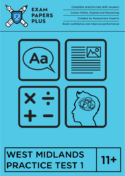
SATs Reading Tips
Bookmark this page? Pop your email into the box below to receive a link to this article so you can easily refer back to it later.
Table of Contents
Introduction
For your child to perform well in their SATs, they must be a confident reader. Reading doesn’t always come naturally to some students, but the good news is there are many things you can do at home with your child to help them improve. In this article, we share some tips that could turn a young reader’s reluctance into enthusiasm.
Encourage Daily Reading
At SAT level, your child needs to demonstrate good reading comprehension, essentially talking about texts and their words. What better way to learn how to do this than to read as much as possible? You can help your child by making sure that they know that books are valued at home and that reading is seen as an enriching and worthwhile activity.
Research shows that reading on a daily basis will significantly improve a child’s reading comprehension, vocabulary and their ability to work out the meaning of unfamiliar words. Once your child gets into a routine of reading every day, it’ll soon become the norm, and they’ll start to look forward to the activity.
Use a Wide Variety of Reading Materials

Children should read a mix of genres, authors and a variety of fiction and non-fiction texts to broaden their reading experience as much as possible in anticipation of the SATs test. Try to introduce a new genre or author into your child’s reading time as often as you can in order to broaden their horizons.
Likewise, giving your child access to a wide variety of reading material like leaflets, poetry, jokes, magazines and comics can help improve their vocabulary and their understanding of language. And reading doesn’t need to be a matter of routine. Try to take advantage of any spur-of-the-moment opportunities, such as menus in cafes, food labels, even household letters.
Read as a Family
Be a role model for your child and make sure that they see you reading too, whether it’s for pleasure, or for work. The more often your child sees you reading, the more likely they’ll be to pick up a book without being asked.
Consider family reading time, where for 20-30 minutes every day, everyone reads together. Reading as a group can be a good way to encourage your child to read for longer periods. Typically, young children start to lose focus after 15 minutes, but if they see that you’re still reading, they’ll be more likely to read a little longer.
Share the Reading
As your child becomes more confident with reading, they’ll start to read more on their own and less to you. A good way to make this transition is to share the reading by taking it in turns to read a paragraph or page aloud. This technique is especially productive if your child is tackling a challenging book on their own.
During shared reading times, discuss unfamiliar words in an effort to expand your child’s vocabulary and ask questions about what they’ve just read. Asking questions like ‘why has this happened?’ Why did the character do that?’ enhances their understanding of the text and encourages them to think beyond the words on the page.
Look for Progress
For your child to perform well in their SATs reading exam, it’s important to be aware of where their strengths and weaknesses lie. Reading on its own often doesn’t provide enough insight into their current level. This is where practice reading papers can prove useful.
At Exam Papers Plus, we publish practice papers for the SATs exam. They cover every aspect of the exam, including the reading element. They’re a great way to familiarise your child with how the reading section is laid out and to give them an idea of the types of reading questions they may be asked. Our papers come complete with marking schemes that enable you to check your child’s answers and track their progress in the lead up to the exam.
Our SATs resources:
Key Stage 1: SATs Practice Test 1
Key Stage 1: SATs Practice Test 2
Key Stage 2: SATs Practice Test 1
Key Stage 2: SATs Practice Test 2
Explore Words
If your child comes across any words that they don’t recognise, and can’t work out their meaning from the context, encourage them to build a ‘new words’ list. Once their reading time is complete, ensure they check the meanings of these words online or with a dictionary.
During shared reading, parents should pick an interesting word that really stands out in the text and ask their child to discuss why it’s a good word to use. You can also ask your child if they can suggest alternative words that could also be used within the context. Any discussion you can create around words and reading will be of huge benefit to your child when it comes to sitting the actual SATs exam.
Help with Reading Problems

Don’t just rely on your child’s school to detect reading problems. Often, by the time reading issues are identified, they’ve already become more serious and require a lot more effort to put right. Spend time with your child focusing on identifying words that they don’t know and try to gauge whether or not they should be able to understand them given their age.
If your child does have a specific reading problem, it’s unlikely to improve without help. Practice SATs papers are one of the most effective ways of highlighting any specific issues, so ensure you use them early, allowing plenty of time to work on any problem areas that you identify.
Be Enthusiastic
Finally, one of the best ways to improve your child’s SATs reading skills is to provide plenty of encouragement and praise, especially if reading doesn’t come easily to them. Your reaction has a huge influence on your child’s motivation and commitment to becoming a good reader. Of course, you’ll need patience, as each child’s reading comprehension ability develops at different rates, but it’ll be worth it when your child’s hard work pays off and they get the SATs results they deserve.
Related posts
English SATs Practice Papers: How They Can Help
The Benefits of Using SATs Practice Papers
Bookmark this page? Pop your email into the box below to receive a link to this article so you can easily refer back to it later.
















